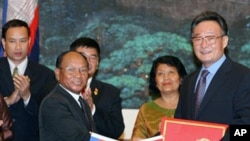Cambodia has increasingly turned to China for economic and political support, US analysts say.
Richard Solomon, a former US ambassador and assistant secretary of state, told an audience when he was one of the panelists at Berkley University in California that under Prime Minister Hun Sen Cambodia has become increasingly reliant on its relationship with China.
“So what will Hun Sen’s government do?” said Solomon, who is the president of the United States Institute for Peace. “They are primarily relying on the relationship with China for their economic development, and, I would assume, also for protection against pressures from Vietnam. If there’s any country that could put pressure on Vietnam these days in support of the Hun Sen government, it’s China.”
The recent development is a product of a long-standing Cambodian strategy, he said.
“Cambodia over the centuries has tried to maintain is independence and survival by maneuvering in this very complicated international environment,” he said.
That balance has proven difficult at times. Many Cambodians harbor resentment for a decade-long occupation that came after the Vietnamese ousted the Khmer Rouge. Cambodian farmers along the border have long complained of border encroachment by the Vietnamese, and critics of the government say it is too far under the sway of the eastern neighbor.
On the other hand, China supported the Khmer Rouge, who based their ideology on extreme Maoist principles. It has now become one of the largest donors to Cambodia, providing around $1 billion in aid last year. With that money, Cambodia has been able to build bridges, roads and other infrastructure, with fewer demands compared to Western aid, which can come with conditions.
“But China is not there as the great charity,” said Joel Brinkley, author of “Cambodia’s Curse.” “It wants something in return.”
China remains hungry for resources, and in Cambodia that means offshore oil and minerals.
Brad Adams, Asia director for Human Rights Watch, said the Chinese aid does not come with requirements for human rights, democracy or the rule of law. This can make it harder for other donors to exert influence over the country, he said.
“I still believe that the Cambodian government does not want to depend only on China,” he said. “The Cambodian people do not want that. They do not want to have only one country that they depend on.”
Nguon Nhel, vice president of the National Assembly and a senior member of the ruling Cambodian People’s Party, declined to elaborate of the relationship, but he said Cambodia has worked to reintegrate with the world following the Khmer Rouge.




